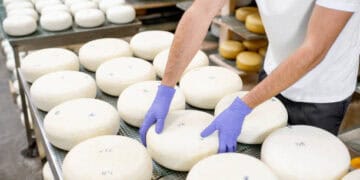An anticipated trade deal that was expected to provide a favorable platform for British cheese exports to Canada has faced setbacks. Initially promoted as a significant post-Brexit opportunity by former Prime Minister Boris Johnson, the deal has run into obstacles during negotiations.
The UK government’s attempts to secure a rollover of the EU’s terms of trade for cheese exports have been met with resistance from Canadian authorities. The existing arrangement, known as the “cheese letters,” which allowed tariff-free export quotas on cheese, is set to expire on December 31st, leaving a regulatory gap.
Starting from January 1st, British cheese exports to Canada will revert to non-EU tariff-free quotas. Unfortunately, approximately 95% of these quotas are already allocated to Norwegian, Swiss, and other producers, leaving little room for British cheese. Imports exceeding these quotas will be subjected to a hefty 245% duty, rendering them economically unviable for many consumers.
While the UK government previously reassured cheese exporters about working on a favorable deal, it is now advising them to prepare for a less favorable outcome.
Darren Larvin, Managing Director of Coombe Castle International, expressed concerns about the situation, as exports to Canada constitute a significant portion of his company’s turnover. The inability to secure a deal on cheese extensions with Canada has raised doubts about the prospects of reaching an agreement in the future.
Several prominent cheese producers, including Neal’s Yard Dairy and the Snowdonia Cheese Company, will be impacted by the failure to strike a deal. The imposition of a 245% duty on cheese imports could result in an additional cost of approximately £50 per kilogram of cheese.
Labour’s Shadow Trade Minister, Gareth Thomas, criticized the government’s handling of trade issues, suggesting that British cheese exporters are facing undue price hikes due to governmental distractions and lack of preparation. He expressed concerns about the terms of the UK-Canada trade agreement, which seem to have created unfavorable conditions for British exporters.
In 2022, UK cheese exports to Canada amounted to £18.7 million. During the broader trade negotiations, Canada had sought concessions from the UK on food standards related to beef imports, which the UK declined to accept.
While some Canadian buyers have stockpiled British cheese ahead of the deadline, it is anticipated that Canadian retailers will face shortages by spring.
William Bain, Head of Trade Policy at the British Chambers of Commerce, emphasized the challenges faced by UK cheese manufacturers and exporters in Canada. He anticipates a concerning period for these businesses during the festive season.
The Department for Business and Trade noted that the UK has the right to access Canada’s dairy market through the WTO and is actively engaging with dairy industry stakeholders to provide support and guidance for potential changes at the year-end. Discussions with Canada on this issue are ongoing, highlighting the mutual benefits of British cheese exports to both nations.
Explore top supply chain news stories at The Supply Chain Report. Visit ADAMftd.com for free international trade tools.
#BritishCheeseExports #CanadaTradeDeal #BrexitChallenges #CoombeCastleInternational #NealsYardDairy #SnowdoniaCheeseCompany #TradeNegotiations #CheeseLetters #DairyMarketAccess #FoodTrade #UKCanadaRelations #TariffImpact #ExportChallenges #BusinessSupport #WTOEngagement















